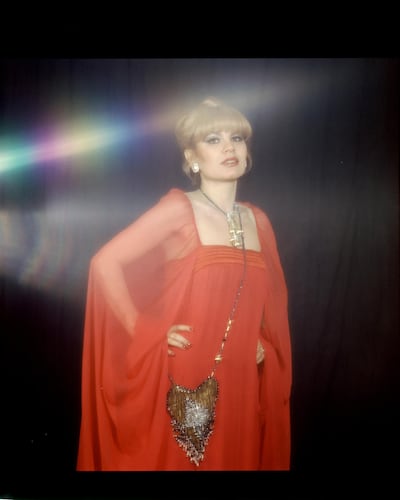As a cultural anthropologist, DJ and avid record collector working between her native Krakow and Istanbul, Kornelia Binicewicz was thrilled when Sony Music Turkey asked her to create a compilation of vintage Turkish pop music. "I didn't hesitate," she says. "I knew there was a huge diversity of fantastic material to work with."
Binicewicz came to Sony's attention thanks to projects such as Uzelli Psychedelic Anadolu, her outlandish 2017 compilation for the venerable Turkish label Uzelli Kaset. But as the founder of Ladies On Record her personal and thus far Anatolia-centric online tribute to lesser-known singers from the 1960s, 1970s and 1980s Binicewicz knew that she wanted to focus exclusively on female artists this time.
Drawn from the back catalogue of three all-important, still surviving Turkish labels – Elenor, Turkuola, and ah Plak – Turkish Ladies – Female Singers from Turkey 1974 -1988 is home to some wonderfully melodramatic performances, with kitschy analogue synthesisers often featuring alongside soaring arabesque strings.
There are elegiac folk songs about the destruction of Alevi community villages such as Dilber Do an's Yikilla Köyler. But there are also disco bangers such as Ne e Alkan's Tut Kalbimi Tut. With regard to the album's broad message, however, Binicewicz says that she is "using Turkey as a mirror to tell a more universal story".
The female singers included
“Of course this compilation speaks about the experiences of Turkish women singers in particular,” she says, “but it’s also the story of women in the music industry everywhere to some extent, and of the social and cultural position of women. The woman’s position in the music industry is usually somehow endangered, and always somehow difficult.”
Other singers featured on the compilation include Huri Sapan, an actress and Arabesque/classical Türk Sanat Müzigi singer who came from a very conservative Laz family in the Black Sea region. Sapan's success with songs such as 1974's Bir ans Daha Ver (Give Me One More Chance) came at a price, her family rejecting her because Sapan pursued a career in entertainment, rather than Laz culture's female roles of home-making and motherhood.
“Fortunately, Huri’s Bulgarian husband was much more liberal,” says Binicewicz. “He told her: ‘Yes, you have a great talent, please use it.’ I’ve met Huri in Istanbul, and she is in her seventies now. She’s a super-energetic woman with a great spirit, and you can tell she was a rebellious girl who just wanted to sing. She’s looking for a new husband now and she asked about my father. She said, ‘How old is he? Maybe we could make a nice couple?’”
Another of Binicewicz's favourite inclusions on the compilation is the late Afro-Turkish singer Esmeray Diriker, whose music, she says, "was my first crush when I moved to Istanbul in 2015". In time, Binicewicz won the trust and friendship of Esmeray's son Kaan, who was able to explain the significance of Esmeray's song 13,5.
"Basically, Esmeray was trying to tell Turkish society that being a black Turkish girl was not easy," says Binicewicz of 13,5's titular reference to a superstition that required Turks to pinch themselves upon seeing a black person in the street. It was ironic that, when Diriker won a 1974 song contest organised by the Turkish National Television Channel TRT, her entry Unutama Beni (Do Not Forget Me) was censored shortly afterwards by the same channel, having been deemed too dark and Arabic-sounding for a TV station increasingly fixated with more western-sounding music.
Putting the album together
In her liner notes for the new record, Binicewicz acknowledges the sharp contrast between the nature of the promotional photos that adorned the sleeves of the original vinyl records, and the lyrics of the songs themselves. For while these female artists were often objectified and portrayed reclining on beds, the songs they sung were mostly about betrayal or rejection. “Yes, they were singing love songs,” says Binicewicz, “but love songs about suffering.”
While putting Turkish Ladies – Female Singers from Turkey 1974 -1988 together, she also researched the (predominately) 1960s and 1970s phenomenon that was the Gazino concert. Advertised on beautifully designed posters, and a valued showcase for some of Turkey's more flamboyant and seductive divas, the Gazino concert was part of a "night of wonders" that also comprised delicious food, belly-dancing and choral performances.
"They were aimed at society's cultural elite," says Binicewicz of these forerunners to the modern rock festival, "and before TV took over in Turkey they were very important. If a singer performed at a Gazino concert she would have work for the next year, but there was a lot of [outlay] for them. Huri Sapan told me she would make a special visit to the shoemaker and the dressmaker."
Despite the odd, notable example of artistic autonomy – Alkan took the Turkish music industry by surprise when she presented her self-produced 1983 album Tut Kalbimi Tut to the Elenor label with non-negotiable plans for its cover-art – Binicewicz feels Turkish Ladies – Female Singers from Turkey 1974 -1988 tells the story of some remarkable women somewhat hamstrung by a patriarchal music industry.
_______________________
Read more:
Review: Uzelli Psychedelic Anadolu: an outlandish new compilation of forgotten Turkish funk
Uzelli cassettes: bringing the sounds of Turkey to 1970s and 1980s Germany
Turkish revivalism: remembering the forgotten musical divas of the 60s and 70s
_______________________
“I think there was a moment in the ‘80s when Turkey really wanted to talk about feminism,” she says, “but society wasn’t really ready for it. That meant female artists had to think about maintaining the record sales that would earn them a living, and so they came back to singing lyrics about broken hearts and betrayed women that were mostly written by men.”
At the very least, Binicewicz’s fine compilation offers a chance to re-appraise some wonderful music, and provides a great insight into the lives and careers of the women who made that music.
“When I go back to Istanbul, I want to meet the singers who are still alive and share a special moment with them about their music being re-released,” she says. “I think it’s a beautiful feeling for anyone who is older and not that visible any more when somebody pays attention. When I told Huri Sapan about this compilation, she said, “Wow! And it’s only women on there? I never thought that could happen.”
Turkish Ladies – Female Singers from Turkey 1974 -1988, is out now on Sony Music Turkey


